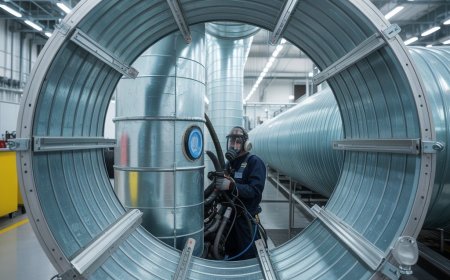AI Development Company Secrets Every Tech Leader Should Know
Discover the insider secrets of top AI development companies. Learn what every tech leader must know to drive innovation, reduce risk, and stay ahead in the AI revolution.

Artificial Intelligence (AI) is more than just a buzzword. Its a force reshaping industries, redefining customer expectations, and revolutionizing how business value is created. Behind every powerful AI product or platform is an AI development company making critical architectural, ethical, and operational decisions. But what really goes on behind the scenes? What secrets do top AI development firms know that every tech leader should be aware of?
Whether you're a CTO exploring AI integration, a founder of a startup, or an executive overseeing digital transformation, understanding how successful AI development companies operate can be a game-changer.
Here are the key insights and guarded secrets every tech leader should know about the inner workings of AI development companies.
1. The Real Magic Happens in Data, Not Just in Algorithms
While flashy AI models get the spotlight, the real differentiator is the data. Elite AI firms invest heavily in collecting, cleaning, labeling, and curating datasets. The secret sauce isnt just the model architecture its the quality and volume of training data.
Insider Tip:
80% of AI development time is data wrangling. The other 20% is spent complaining about it. A common saying in AI teams.
Actionable Advice:
If you're hiring an AI company, ask them about their data engineering process. Ensure they have robust pipelines for ingestion, annotation, augmentation, and validation.
2. Not All AI Talent Is Equal Hire Strategically
Theres a common misconception that all AI developers are interchangeable. In reality, AI talent varies greatly from theoretical researchers to applied engineers to ML Ops specialists. Successful AI companies know how to assemble cross-functional teams with the right mix of skills.
Roles to Watch:
-
Machine Learning Engineers: Build and test models.
-
Data Scientists: Analyze patterns and interpret results.
-
ML Ops Engineers: Deploy and scale models.
-
Domain Experts: Help contextualize and fine-tune AI to specific industries.
Secret: Many top firms also maintain an internal talent bench a curated network of freelancers and contractors they bring in for specialized AI tasks.
3. AI Projects Live or Die by Use Case Clarity
One of the most overlooked aspects of AI development is problem definition. Great AI companies dont just build models they interrogate the business problem deeply. They ask:
-
Is AI really needed here?
-
What would success look like?
-
Whats the baseline, and what is AI improving?
Secret Weapon: High-performing firms run AI discovery workshops with clients to co-design the AI use case before a single line of code is written.
Tech Leader Tip: Demand a proof-of-value (PoV) phase. Its better to invest in defining the right problem than in building the wrong solution.
4. Responsible AI Is Not Optional Anymore
The best AI development companies bake ethical frameworks into every layer of development. Bias detection, fairness checks, transparency, and explainability aren't just add-ons they are essential pillars.
Behind the Scenes:
-
Ethical audits are conducted on datasets.
-
Explainability (XAI) tools are integrated into model outputs.
-
Differential privacy and model interpretability techniques are standard.
Warning: AI solutions developed without responsible AI practices can expose your business to legal and reputational risk.
Action Item: Ask your vendor: How do you ensure fairness, transparency, and compliance in AI systems?
5. They Build with Modularity for Scale
Scalable AI isn't about building monolithic models. The smartest AI companies architect modular systems that can evolve over time. They use microservices, containerization (Docker, Kubernetes), and APIs to ensure flexibility.
Real Talk: No model lasts forever. Data drifts. Business needs change. Models need to be retrained, replaced, or scaled.
Tech Stack Insight:
-
Model versioning tools: DVC, MLflow
-
Containerization: Docker, Kubernetes
-
Pipelines: Kubeflow, Airflow
Strategic Secret: Modular AI design shortens development cycles, simplifies testing, and accelerates time-to-value.
6. They Automate Everything Possible
Top AI development companies embrace MLOps (Machine Learning Operations) just like DevOps for software. Automation is the backbone of consistency, quality, and reliability.
Automated Workflows Often Include:
-
Data validation
-
Model training
-
Hyperparameter tuning
-
A/B testing
-
CI/CD pipelines for model deployment
What You Should Know:
AI without MLOps is a prototype. AI with MLOps is a product.
Ask your AI vendor if they have a full MLOps pipeline and how often its tested.
7. They Dont Chase Hype They Build for Impact
Theres always a new algorithm, a trending paper, or an AI breakthrough. But serious AI development companies prioritize results over razzle-dazzle. They use proven architectures unless theres a strong reason to innovate.
Example: While GPT-style large language models are powerful, they are not needed for every NLP task. Sometimes, a smaller transformer fine-tuned on proprietary data performs better.
Tech Leader Trap: Avoid companies that overpromise cutting-edge AI without linking it to your actual business KPIs.
8. Data Privacy and Compliance Are Deal-Breakers
In industries like healthcare, finance, and education, AI must comply with regulations like GDPR, HIPAA, and PCI-DSS. Elite AI companies know how to:
-
Use synthetic data to protect sensitive info
-
Mask personally identifiable information (PII)
-
Maintain detailed data lineage logs
-
Secure models with encryption and access control
Best Practice: Look for AI development partners with legal advisors and data governance experts on staff not just engineers.
9. Iteration, Not Perfection, Is the Mantra
The most successful AI solutions didnt launch perfectly. They started small, delivered value, gathered feedback, and evolved.
Agile AI Development Looks Like:
-
Week 12: Data exploration + PoC design
-
Week 36: Initial model + test data runs
-
Week 710: Real-world testing + feedback
-
Week 11+: Model refinement + deployment
Secret: They often use a shadow mode deployment running the AI alongside human workflows without taking control to gather comparison data before going live.
10. Post-Deployment Monitoring Is a Must
What happens after a model is deployed? Thats where many projects fail. Great AI companies provide ongoing monitoring, performance tracking, and alerting.
Monitoring Metrics Include:
-
Data drift
-
Model confidence levels
-
Accuracy degradation
-
Latency and system uptime
Tools Used: Seldon, Prometheus, Grafana, Evidently AI
Your Role as a Tech Leader: Ensure your AI partner has a post-launch monitoring strategy not just a delivery hand-off.
11. They Value Documentation and Explainability
Documentation is not glamorous but its essential. The best AI firms create detailed model cards, explainability reports, and user guides.
Why This Matters:
-
Helps your internal team understand how the model works.
-
Ensures reproducibility and trust.
-
Simplifies audits and updates.
Bonus Insight: Explainable AI (XAI) isn't just for regulators. It improves internal adoption and stakeholder trust.
12. AI Development Firms Are Also Strategic Advisors
Top-tier AI development companies act as strategic partners, not just vendors. They help you:
-
Identify high-impact AI opportunities
-
Avoid pitfalls (technical debt, scope creep)
-
Build AI maturity inside your org
Secret Edge: Many firms offer AI capability-building workshops and training so your internal teams can take ownership in the long term.
13. Culture Alignment Is a Hidden Differentiator
Here's an underappreciated truth: culture fit between your organization and the AI development company matters more than you'd think. Misaligned expectations, communication styles, or agility levels can derail even technically sound projects.
Evaluate Culture Fit Through:
-
Pilot projects
-
Collaboration workshops
-
Frequent retrospectives
Tech Leader Tip: Choose an AI company whose working style complements yours. Alignment beats raw horsepower.
14. Proprietary ? Better Open Source Is Often Preferred
While some AI development companies boast about proprietary models or tools, many top-tier ones embrace open-source ecosystems for transparency, flexibility, and faster iteration.
Popular Open-Source Tools:
-
TensorFlow, PyTorch (Model development)
-
Hugging Face (NLP models)
-
Apache Spark, Dask (Big data)
-
LangChain, LlamaIndex (LLM orchestration)
The Truth: Proprietary solutions often lead to vendor lock-in. Open source fosters innovation and ownership.
15. The Best Companies Are Selective About Clients
Just as youre selective about vendors, the best AI development companies are selective about projects. They look for:
-
A clear path to impact
-
Access to usable data
-
Willingness to iterate and learn
-
Ethical alignment
If a company says no to a project that isnt feasible or valuable, thats usually a green flag, not a red one.
Conclusion
If you're a tech leader looking to build or scale AI in your organization, treat AI development company not just as service providers but as partners in transformation.
Look beyond the marketing pitch. Ask about their workflows, values, and long-term engagement plans. The real secrets to success with AI lie not in isolated genius but in consistent processes, collaborative cultures, and shared business understanding.
































